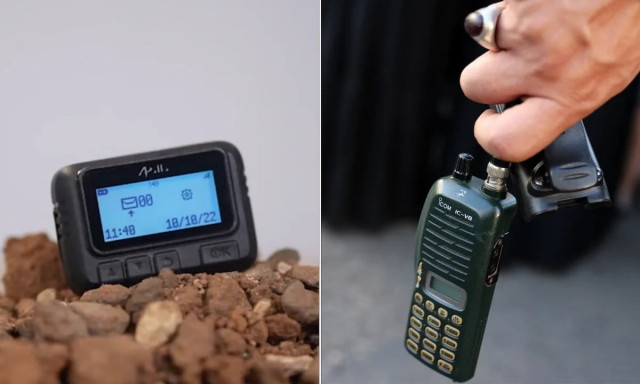Israel's Pager, Walkie-Talkie attacks imperil supply chain
Such risks can be limited through adoption of blockchain technology, real-time audit of supply chain

The back-to-back pager and walkie-talkie attacks on Hezbollah members in Lebanon around a week ago have frustrated and challenged the credibility of international traders, suppliers and multinational companies as the entire global supply chain is being threatened in the current economic scenario where confusion and fear prevail in the international market.
Gadget-cum-device manufacturers from a foreign country on condition of anonymity said the recent pager and walkie-talkie attacks on Hezbollah pose a threat to the global supply chain in the wake of concerns over the security of electronic devices. All companies dealing in mobile phones, sensitive gadgets, other devices, etc must reassess their manufacturing and supplier practices with a view to scaling down such risks.
Organisations and countries must purchase products directly from branded companies, if they want to keep their plans and strategies clandestine and secret, they must send their own representatives for purchases from various outlets and eliminate the role of suppliers.
It is crystal clear that Hezbollah, a Lebanese political party and military organisation, has many loopholes in its security system. Lebanese officials claim that Israeli agents concealed explosives inside batteries of the pagers sold to Hezbollah.
Global supply chain expert Majyd Aziz said, "It is imperative that global leaders sit and decide once and for all that the world has had enough tragedies and it is time to settle contentious issues through fast-track mediation, or alternatively through enforceable arbitration."
He cautioned that after the infamous pager episode, the doomsday proponents are promoting a prognosis of horror, fear, and apocalypse.
The immediate scare is that this type of catastrophe can occur within the global supply chain and cause large numbers of casualties and destruction in air, sea, and on land. No one would be safe from the technological terrorism.
Most of these theories are, however, unfounded because mega-scale man-made disasters are unlikely in the future. Any diabolical action could also boomerang and hit the perpetrators too.
Eminent International Safe City Consultant Dr Noman Said was of the view that companies from Taiwan and Japan may not necessarily suffer from such incidents; still, these weaknesses are commonplace.
"Such risks can be limited by ensuring the adoption of blockchain technology or real-time audit of supply chain," he said.
To win back trust in western products, notably electronics, strict requirements for the certification of information security management systems should be put in place like the Common Criteria for Information Technology Security Evaluation (ISO/IEC 15408).
In 2023, Apple provided additional information about its supply chains, environmental, and labour practices to further enhance the commitment of the company, which may be adopted by the electronics industry to maintain product integrity and safety.
Like other countries, Muslim nations are also vulnerable to technology warfare. For example, in 2026, the UAE's cybersecurity budget, which is set to rise to about $2.5 billion, is aimed at defending important sites and enhancing systems against cyber insecurity.
Focusing on such regional cybersecurity collaborations and developing local capacities could help countries avoid cyber warfare and technology abuse.
A major component of the global supply chain of some industries such as electronics has become susceptible to abuse and disruption.
According to the World Economic Forum's 2021 Annual Global Risk Survey, 40% of businesses predicted that supply chain-related problems would extend past 2024. Solutions like monitoring transportation using the Internet of Things (IoT) combined with different technologies like blockchain would improve the visibility to undertake security measures from electronic items to EVs and even crude oil.
The phenomenon of cyber warfare in the current technological world is only less than a quarter of a century away and events such as bombings in Lebanon through the use of communication devices prove just that.
Moreover, based on a report of Cybersecurity Ventures in 2022, it has been projected that cybercrime would be a global business amounting to $10.5 trillion in annual losses in 2025, which reveals how the advancement of technology is being weaponised. Such events emphasise the necessity of ensuring and enhancing IT security and cryptography to stave off the threat.
Israel's record over the years regarding security technology has been worth noting. It spends nearly 5.2% of GDP on arms and military equipment such as electronic and cyber warfare systems.
As a case in point, Unit 8200 of the Israeli Defence Forces is known for its intelligence, including the capability to turn off and use devices such as pagers and radios.
First, it was pagers, then walkie-talkies; a wave of explosions rocked Lebanon. Two-way radios detonated at homes, offices, and even at a funeral, a day after some 3,000 pagers blew up across the country and in Syria. In both cases, the devices were used by members of Hezbollah.
Some 20 people were killed and 450 injured in the latest attack, on top of at least 12 killed and nearly 3,000 hurt, many badly, in the pager blasts. Hundreds of people were blinded because they were looking at their pagers just before the devices exploded. Others lost fingers and hands.
In photos from Lebanon, the devices that exploded on September 17 seemed to bear the trademark of Gold Apollo, a Taiwanese company. But the firm denied making the pagers and said a Hungarian firm, BAC Consulting KFT, had a "long-term partnership" to produce them.
"Our company only provides the brand trademark authorisation and is not involved in design or manufacturing," Gold Apollo said in a statement a day after the blasts.
From there, the story gets weirder. Before it was taken offline, BAC's buzzword-laden website said the firm was a consultancy working on sustainability and development.
A LinkedIn profile of its CEO says that she worked for the UN nuclear agency, supported small businesses in Libya and helped women in rural Niger adapt to climate change. It makes no mention of the business of pager manufacturing.
The firm's address is listed as a villa on a residential street in Budapest. Calls to the number listed went unanswered.
Wherever they were manufactured, it seems clear that Israeli agents hid explosives inside the pagers before they reached Lebanon, and did the same with the walkie-talkies. Thousands of Hezbollah men were unknowingly carrying small bombs on their bodies, which Israel then detonated almost simultaneously.
The writer is a staff correspondent



















COMMENTS
Comments are moderated and generally will be posted if they are on-topic and not abusive.
For more information, please see our Comments FAQ